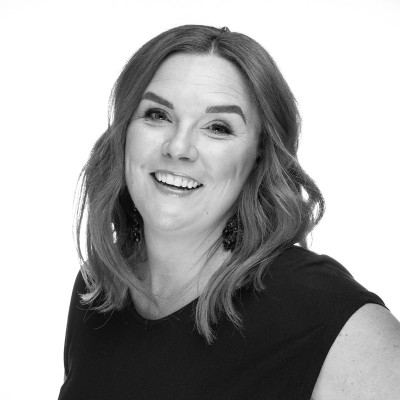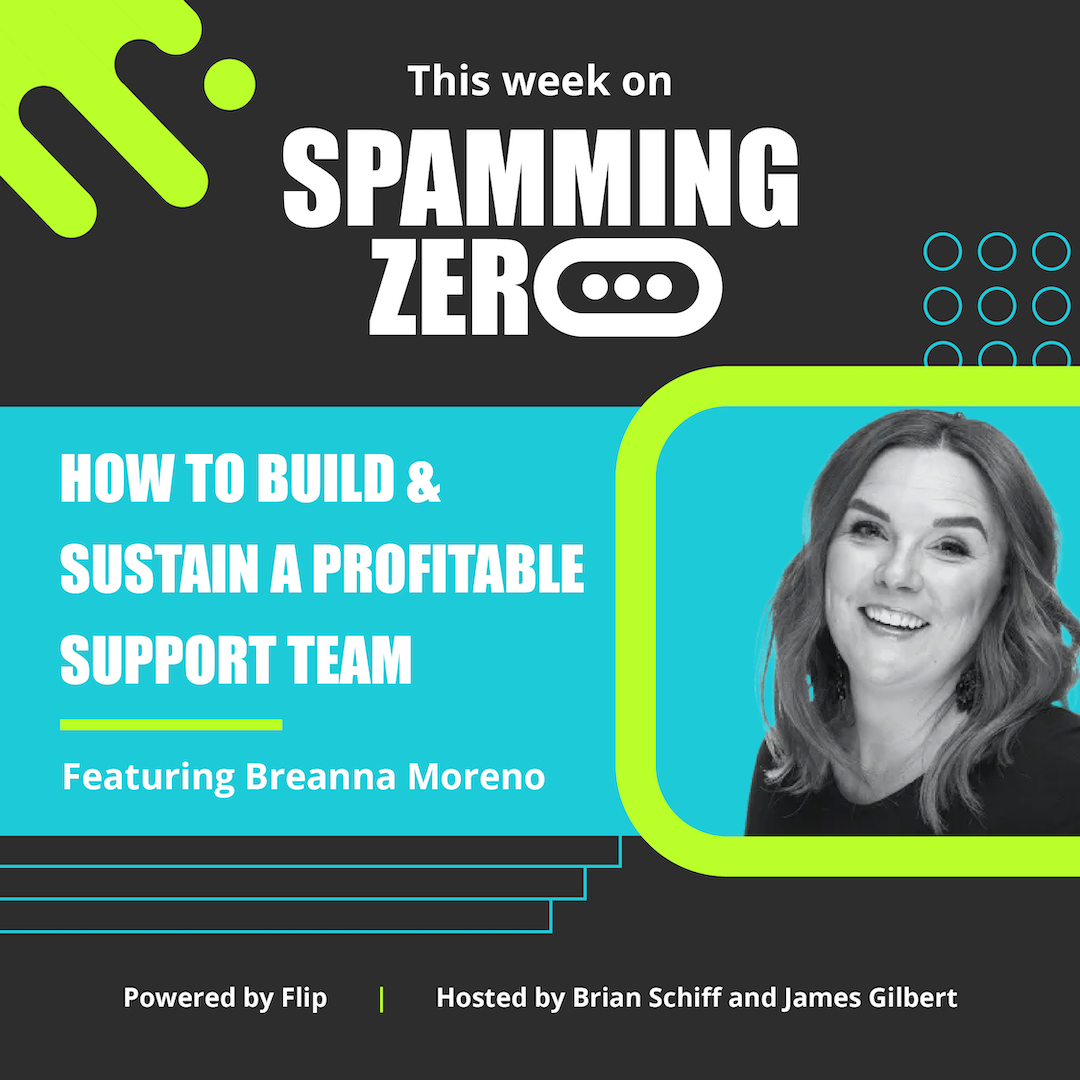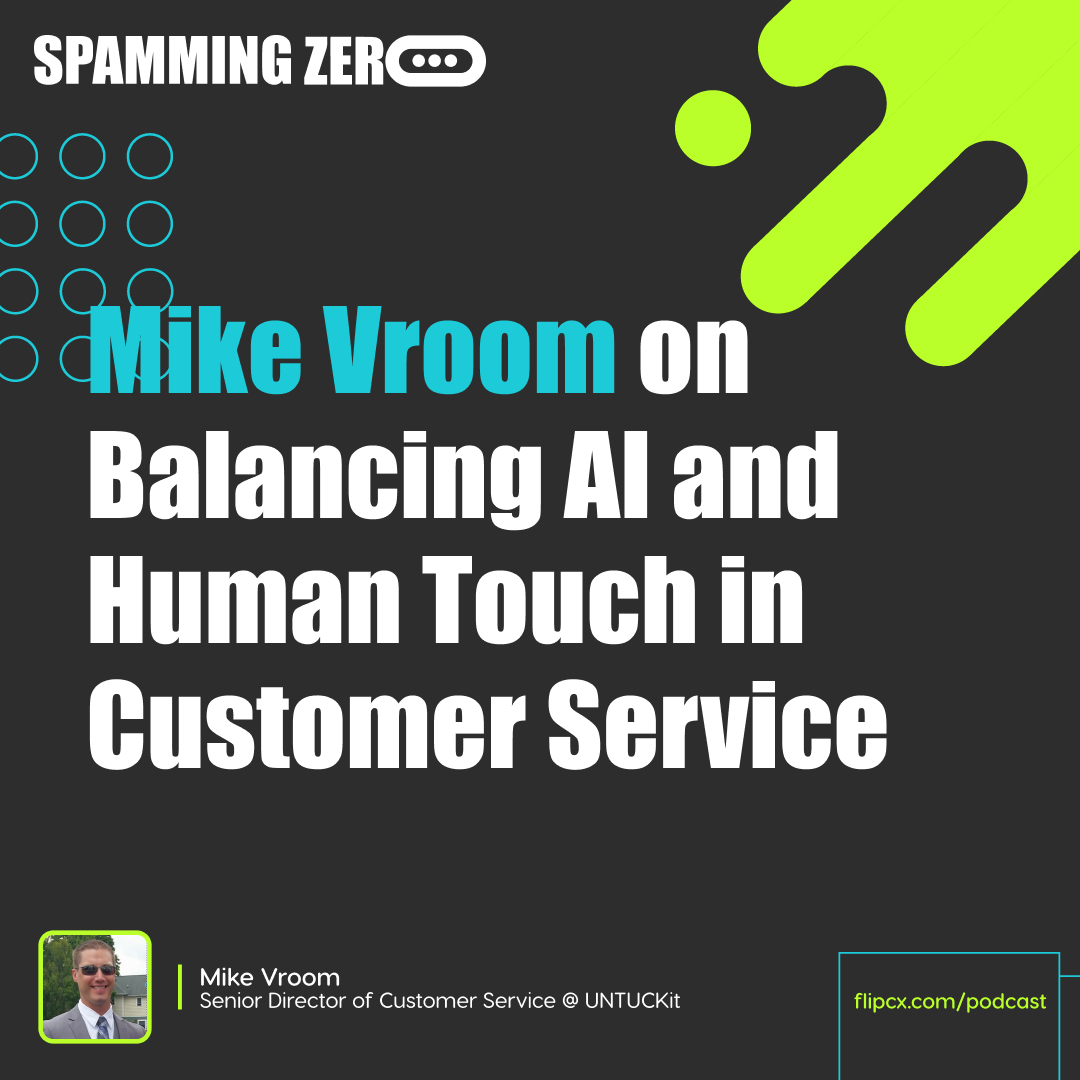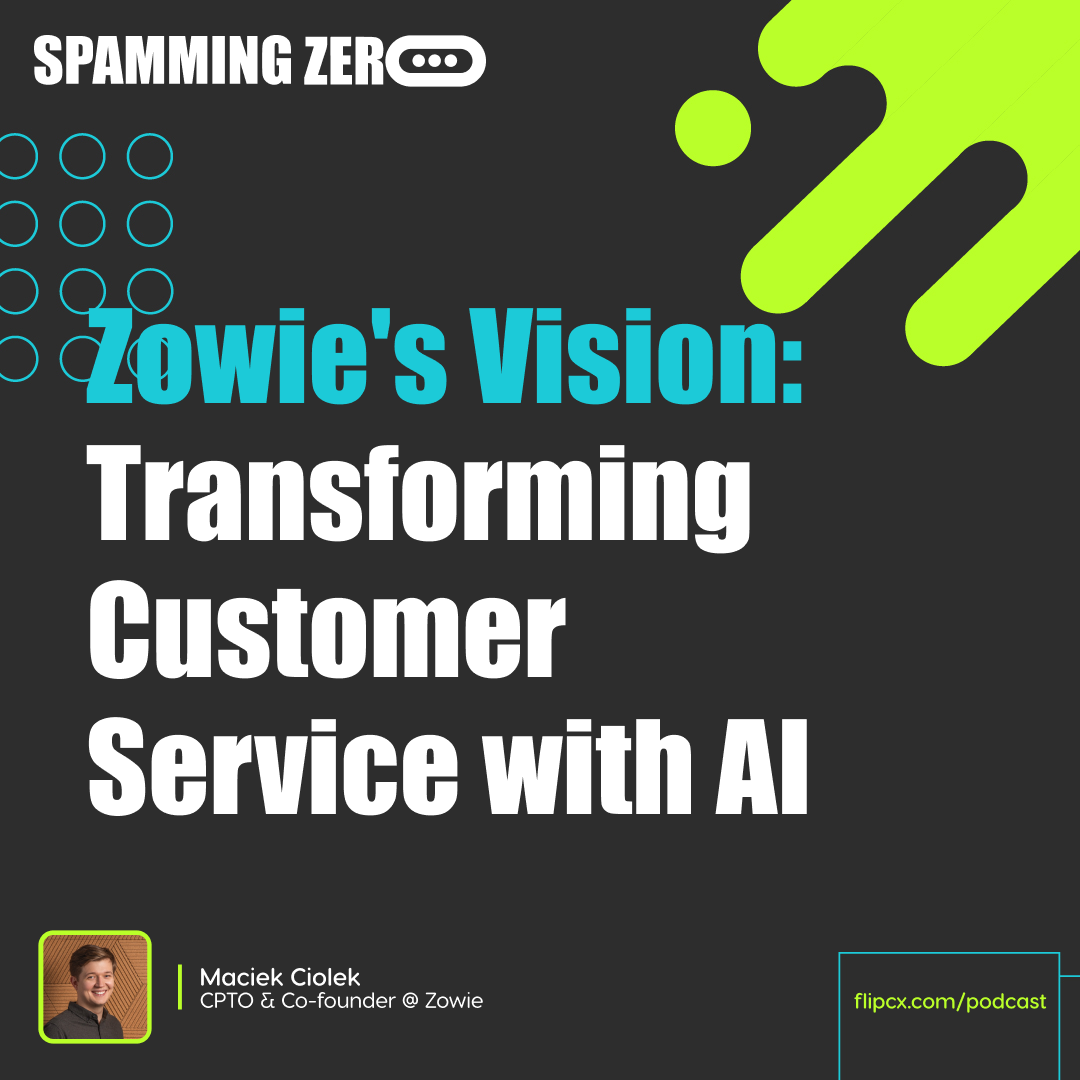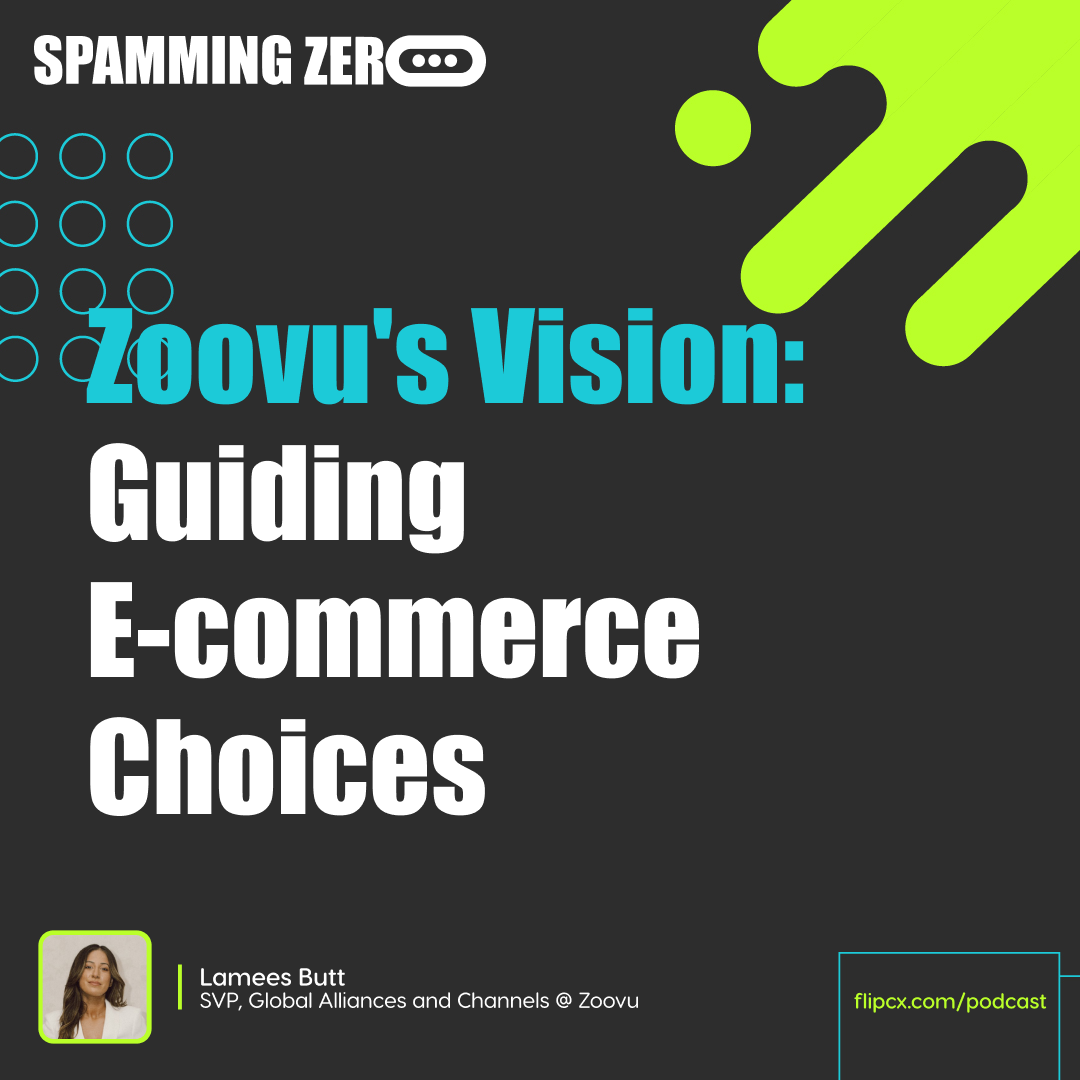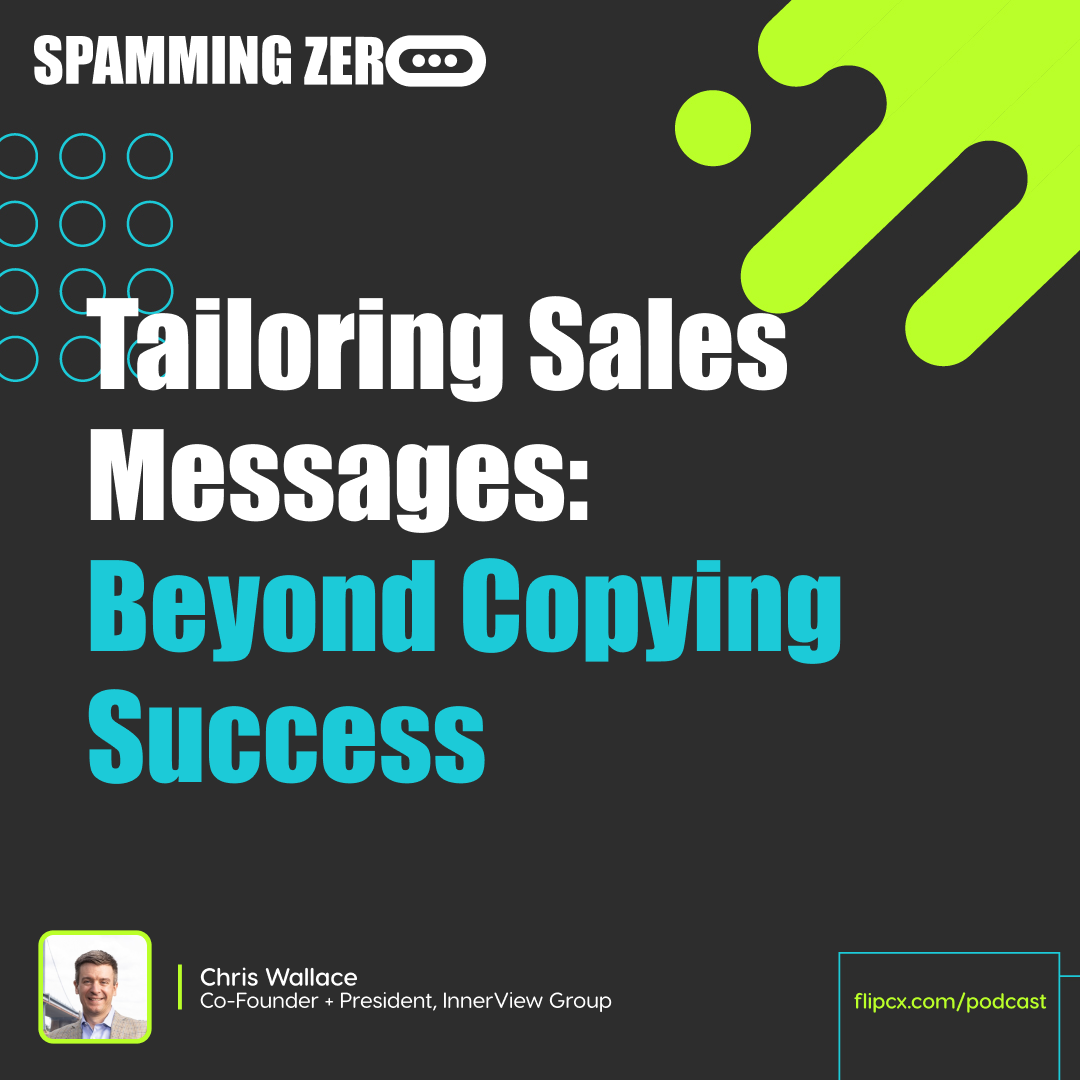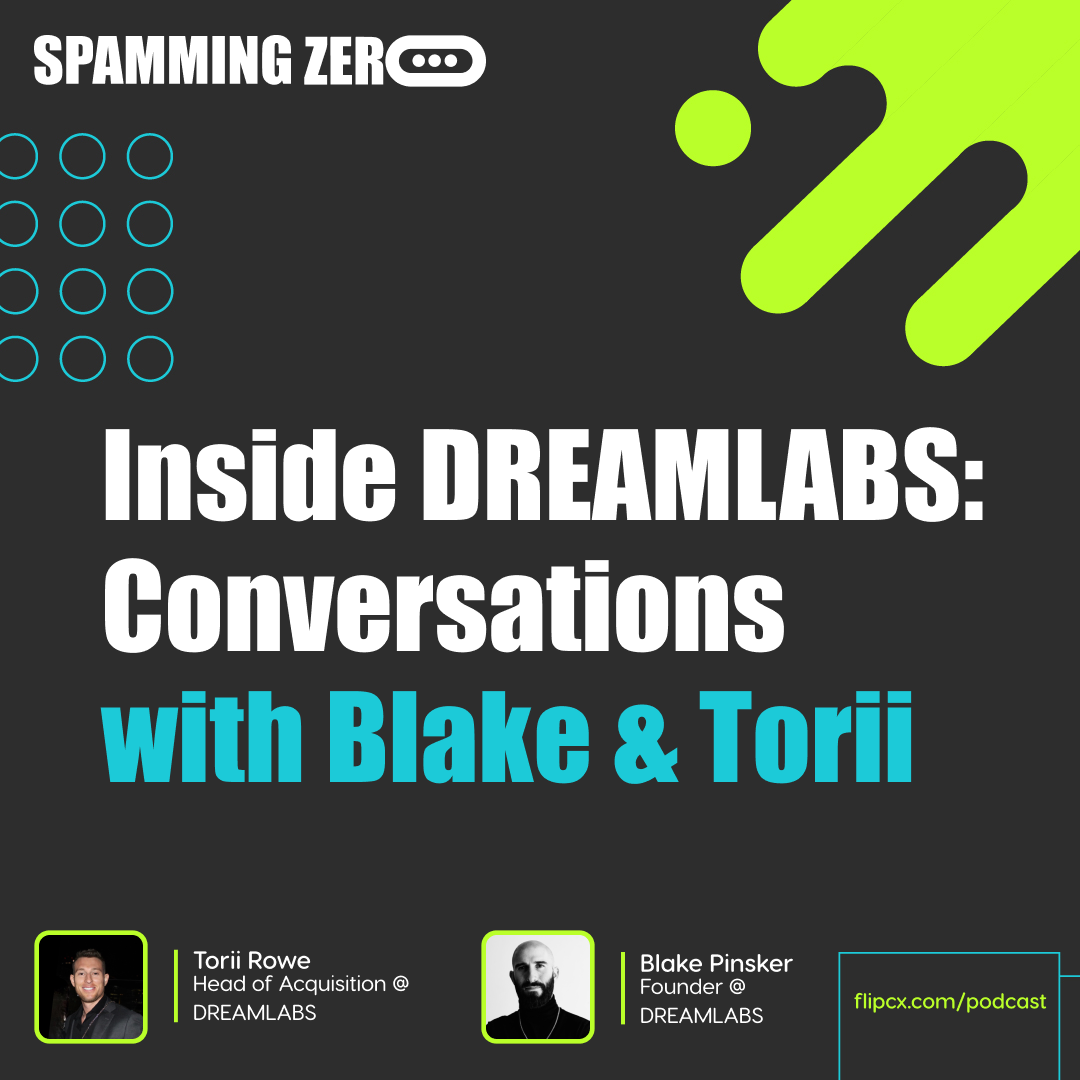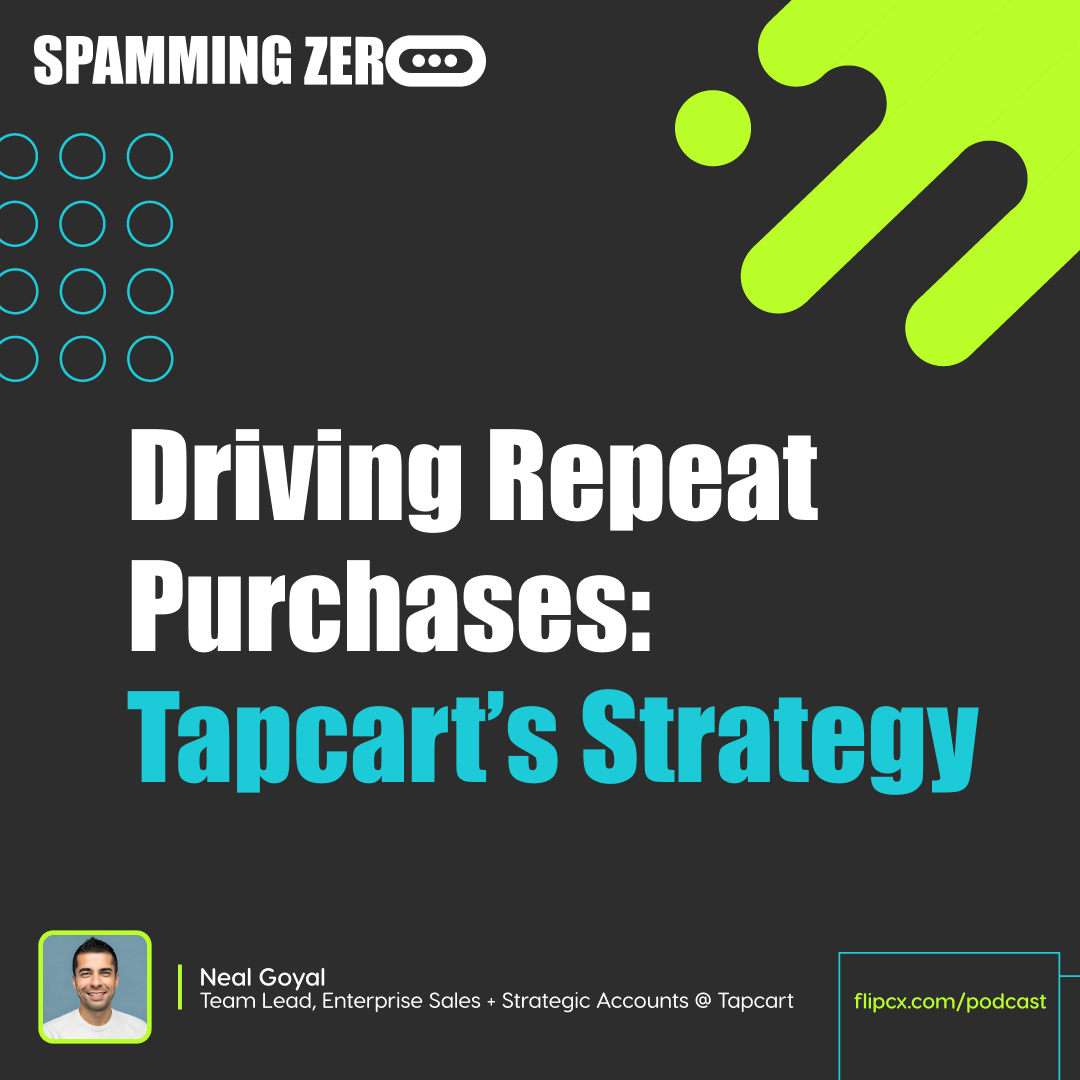Episode 29: True Classic's Breanna Moreno On How To Build & Sustain A Profitable Support Team
- 0.5
- 1
- 1.25
- 1.5
- 1.75
- 2
James: Here we are back for another episode of Spamming Zero. We're joined by the Vice President of Customer Experience at True Classic Tees this week. Her name is Breanna Moreno. True classic Tees is a startup looking to change the way that men's apparel is being done. And if Breanna has anything to say about it, they're definitely on the right track. I'm super excited about this episode because we are going to be talking about how to build and sustain a profitable support team. She gave this talk at DTCX not too long ago. Highly recommend you go check that out, it's on YouTube. Or if you go to DTCX's website, you'll actually see the entire link there. You can see the video of everything. We're going to unpack a lot today. Also, just to give you a little bit of who Breanna is, there's this quote that she has on her profile on LinkedIn. Check her out, make sure you connect with her. Here it is. " I think most people dread customer service out of fear of the unknown or assume it's always problematic. The reality is customer service is a blessing to your business, your brand, and your employees. If you do customer service well, everyone reaps the rewards. Customer service does not have to suck. I like to think our model is changing the vision of customer experience as a whole. We make it fun and look easy. And you're going to find out exactly how. Stay tuned, I promise you'll not want to miss this." We'd like to thank this month's sponsor, LTVplus. They are a customer service outsourcing partner. LTVplus provides world class customer service outsourcing to help e- commerce brands increase their customer lifetime value. We fully believe in that. We recruit and train agents from all over the world to give your e- commerce business the right people skills and language for success. Part of their mission is to rid the world of bad customer experiences, part of their vision, increase the customer lifetime value of e- commerce brands. Love what they do, they're also a very important part of our ecosystem. Check them out, LTVplus. com. I'm James.
Brian: And I'm Brian.
James: And this is Spamming Zero. Welcome to another episode of Spamming Zero. We are joined by Breanna Moreno.
Breanna: Hello. Hello. So happy to be here.
James: All right. So Breanna, we reached out to you because of a session that you did at DTCX and I'd love for you to... We kind of want to unpack this session because we've heard such amazing things about it. I would love to start by just asking you the question of what your session was built off of.
Breanna: It's definitely taken lots of learning, but I've been in the industry for long enough now that I'm able to kind of put it together and break it down for our industry leaders to hopefully emulate. And again, hoping that it helps everybody in some capacity, whether you're in a CX position or not. But I think just me personally, is I'm very driven by kind of successes and I measure those successes in revenue, in value. So early on in my career when I took over support departments and worked to scale them, I'm always thinking, " How can we scale in terms that doesn't cost our company and hurt our company to where we can offset those added costs in revenue?" So my motto is always" work smarter, not harder". And it's just essentially built from that. What can we do to showcase our value? Add, obviously, conversion and metrics to what we do. Making sure that we're getting more done in less time because it impacts your overall just performance. So it was really easy for me to get up there and just say, " Look, here's what we do." And then just trying to break it down in simplified terms so that everybody could walk away with something.
James: So just to give you a little bit of kudos here, here Breanna is on a podcast with us. So how in the heck is she able to do this? Well, she's built a sustainable support team that is working a fantastic job.
Breanna: Thank you. Yeah. No, you know what? We went into this season knowing kind of where it falls in the grand scheme of things. You can never essentially prepare for every little thing, but we try. And I think that just is thanks to my experience and our work ethic of how we like to work and prepare for the unexpected, which even I talked about in our DTCX kind of conferences, we've got to be so far out front that our turn time to fix problems is so much more minimal than we were the week before. We've got to constantly be working to get better. So really a testament to my team. I have some killer players and I talked about that in our talk as well of just like... That's what we need to be focusing on, is putting more resources and accolades and support to those frontline people because they really are the ones making your business. Like, hands down. Your marketing team can be bringing them in, right?
James: So true.
Breanna: But at the end of the day, that person that they chat with or email with or get on the phone with is going to make or break that experience. And so it is so valuable that we kick ass at what we do because we wear so much pressures of the company and the company's success. And even when we do things wrong, we got to fix it.
Brian: So for those that didn't hear the session, are there... What are your core pillars? You talk about the fact that you've learned these things over time and it's all operating under this umbrella mindset of work smarter, not harder in order to drive measurable impact on revenue for the business. But what are those go- to pillars for you?
Breanna: I started with just talking about... I think I broke it down in three different areas. And one of them was building; how you're going to build that sustainable and profitable support team. And I like to look at that. Anytime I come to a new brand and I kind of take over how to scale out their support, I just start with a super solid foundation. And in support a lot, it's hard. You have to think about scaling for your team. So you got to build out metrics to understand how many service people do I need, how much should they be tackling a day, or an hour, whatever metrics you use. So you've really got to work with that building piece, thinking about what channels are you going to offer. And this is that piece where I got into the phone support is like... We should be wherever our customers are. So wherever your brand takes you, if your customers are there, we should meet them there. And no matter what we think personally, if we think phone support is going out of date, you're wrong. Try it all because if your customer is there, then you should be there too. So really getting back to the basics and then going above and beyond, never being afraid to try new things. And thinking through obviously quick response times. We all know that, right? It's customer support 101, quick response times. But you've got to have efficient processes in order to hit those quick response times, which I think is what makes support such a daunting task a lot of times is people just draw out these escalation procedures and you've got to... You're the front line, then you got to escalate it to the second line, and then the third line, and it's just like cut out all that junk and really empower your team to get done what you need them to get done. Be careful with automation. Sometimes that frustrates people. And another piece in the building structure is just productivity. That's measuring how much we're getting done, which is a really big pillar because that's showcasing to your company your value. And like I told you, that's to me really really valuable to me reporting up to our CEO, is like, " Look at what I'm bringing. I am bringing in all this revenue. My overhead is super minimal and look at what we're getting done." Not many departments are going to attach that productivity to their daily rapport. We're not looking at what you guys are tackling every day. But I love that, I love to showcase that every week of like, " Look at how much our support team accomplished this week." And then to see that grow year over year has just been amazing. We dig into the specifics of just customer support in general; being relatable, being a real person, really building that core. So thinking, " How do I want my department run? What do I need to run it? How am I going to measure the impact and the value we're adding?" And then, " What are my customer service like basics to make sure that I am providing the right kind of level of support?" So now we know, we've built it out, how are we going to sustain it? Because I think a lot of times in retail, in e- commerce, you think of customer support as your frontline. High turnover, no big deal. I'm opposite of that. I want my team to stay here. I'm very culture- driven and I believe I'm going to get more out of people the happier they are. The other piece of that is we're teaching our support team so many intricacies of our business, giving opportunity to those frontline employees to move up. They end up becoming some of your best employees later on in life that have moved up through the company and they know, like I said, your brand the very best. And then with sustainability, it's not just about your customer's experience, it's about your employee's experience. So giving them a voice I think is huge. Giving feedback from those people that are hearing it firsthand from your customers is really going to be a benefit that everybody should leverage. So giving them a voice is so important. And then working to retain that employment in different areas like culture, obviously huge, but even just incentives and benefits. And with that, like I told you earlier, I want to offset my costs. So I challenge my team to think through ways that we can sustain our customers that we may otherwise have lost.
James: There's a couple of things that I want to unpack that you've mentioned. One of them is you had mentioned being where your customers are, which in my mind, it can also be translated as like walk in your customer's shoes.
Breanna: 100%.
James: I think everybody in this whole wide world has heard that, one version of that saying in some way. And we kind of brush it under the rug because it's so simple. " Oh, walk in your customer's shoes, who doesn't do that?" That's typically the response. And if you're building foundational support and customer experience and customer service, let's say, you are not focused on necessarily customer experience yet because you haven't figured out how to measure those things, but you're just like... You're wanting to provide a good support system for your customers. I just don't want brands to push that under the rug anymore. And that's what's happening right now in the market. It's all over the place. People removing their phone numbers or removing even different areas of support just for the simple terms of let's save on money and let's start there. That's not with the customer in mind.
Breanna: No.
James: And the way Brian put this pretty eloquently when we were having a discussion internally, it's... You don't have the customer... You don't think about the customer first, instead you think about the board first, the business outcome first, rather than the customer first. And I think that too often brands are getting into the habit of doing this and it's disgusting to me.
Breanna: Yeah.
Brian: I'm curious for you as somebody that... You came on the show, the first thing you said was that you measure yourself on revenue, you mentioned that you report directly up to the CEO at your company, right? So you're needing to have these conversations, you're needing to justify these numbers. How are you attributing and measuring at True Classic?
Breanna: There's a wide range of metrics that I use, but that's essentially my last pillar, is profitability. And that's how I offset the cost. So I did this at one of our team meetings and I took what we made in conversion and I obviously did the metrics to say, " Okay, what am I paying an agent?" And this is how much we brought in versus my cost and it was millions in revenue that we brought in over what I'm spending on agents. And that just was a real oh shit moment I think of like... Oh wow. And the reason why I want to highlight that is because I want everybody to understand this is why I am such a stickler on work smarter, not harder because we can get so much more done if we aren't chasing our tails all the time. If we aren't trying to cut out processes and channels of communication because we're trying to save a buck. Instead, think through, " Okay, how can I automate a piece, a portion of what we do and then still allow leverage for people to get to us?" And I think what is the hardest thing right now throughout our industry is attaining that customer support when you need it. I'm a person that... Look, I'll go on a website and I'll figure it out on my own, I'm very self- service oriented, but when I want an agent, I just want an agent. And you know sometimes that's harder than hell to get access to somebody. So that is a huge proponent of why, and everybody can go read our reviews of True Classic on just how successful we've been organically. I'm not even paying these review sites, but just legitimate organic reviews about our support. And it is like our CEO says, Rolls- Royce quality, because we just want to always go above and beyond. And it is a testament to show, just because I'm going above and beyond, I'm not cutting any corners, I'm also not in the hole. So we get really strategic on our reporting, thinking through how much am I spending on an agent per hour versus how much are they accomplishing in that hour? And then how much revenue do we attach to that? And conversion. We're super successful in that realm too. Even with our social media team and their kind of community support, they're taking care of all the comments and direct messages that come in. Same applies to them, it's just another outlet, another channel. So I'm a big proponent of be wherever your customer is because that's a potential avenue for revenue. Why don't you want to be there?
Brian: And what are the primary points in the customer journey and channels and methods that are generating the conversions for you?
Breanna: We do such a great job just through our marketing initiatives and just the ease of flow when people come to our site. We don't want to have any friction. But the biggest piece is being able to reach a real agent to ask for questions like on sizing or return policy. Like yes, they can click and read it themselves 100%. It's there for that person that is that kind of self- service oriented type. But for the person that just isn't there and they've got three seconds and they want to ask this question, we're going to be there because that's a leverage. And the fact that I'm there just gave them assurance that they could trust that somebody's going to be there to support them and they're going to hand over their wallet. So definitely you have to attribute meeting people where they're at with trust. And if there's any friction in that process or that experience, they're going to immediately say, " Forget this, I'm out. Because this is too hard." And we have to think through that, especially as we're in the gifting season and we're gifting products for somebody else. We don't want to then create a pain in the ass experience for our dad that we just bought this shirt from and let's say he wanted to buy more or needed to exchange a size. We want to make sure that through every single opportunity we're utilizing every means possible to convert that customer and provide an experience at the same time.
Brian: So would you say that most of it is people that are kind of pre- purchase and in that purchasing journey and you're able to come in, provide that help, get them over the line, versus people that are post- purchase? Right? So you even mentioned ...
Breanna: Solving for a problem?
Brian: Right. You gave some examples of somebody with a... Yeah, like how much are you...
Breanna: I would say it's probably...
Brian: Turning those people into repeat purchasers.
Breanna: Yeah. So it's probably like 50- 50 to where 50% of our time we're converting brand new acquired customers and the other 50 were probably fielding questions on a shipment or, " My package isn't here on time." To, " I have a return, this didn't fit." Or there's some sort of an issue. And we use those opportunities to fix it. And that's where... I think that's where we see the... We're obviously successful in both fronts and again, our conversion rates are out of control, upwards to 15% sometimes of just converting people. So we definitely have huge success rates on both fronts, but even for the returns piece, letting them know, " Do you need help with sizing?" Instead of just saying, " Here's how you do a return." We're offering support in how can we help you with sizing, and that in turn has also leveraged us a ton of success in keeping that customer instead of them just submitting a return for a refund and them going away forever.
Brian: So pre- purchase returns, are there other kind of key areas that stand out as like, " Hey, doing this a lot better is directly driving measurable revenues in business."?
Breanna: Revenue, yeah. Product reviews too, I'd probably say product reviews. Adding in any type of a review platform or specific to product reviews that are prompted. Those too, we leverage those as opportunities, which has been super successful for us as well.
Brian: And what is the message to those people in broad strokes?
Breanna: So those are super minimal because generally our reviews are absolutely great, but every now and again you'll get a product review with somebody that had a mishap in the product or sizing wasn't right, so they'll leave that on their review. And we'll just make an attempt to contact them and see if we can improve the experience. Anything that could potentially be read as like, " Oh, they weren't over the moon excited." We're going to leverage that and see what do we need to do better.
Brian: You've identified these areas in the customer experience where your team can drive directly attributable revenue. Are you specializing your agents against those high value interactions? So are you saying, " I want the five best agents or the three best agents to be on those conversations and then the other people on the team are going to be on different conversations."? How do you think about that piece of it? Is that kind of part of the puzzle for you?
Breanna: Yeah, that's definitely a part of the puzzle. You kind of have to shift too. I think with support, you can't stick one agent in one channel forever because then you start to get burnout and it's the same stuff all the time. So we like to keep things spicy by moving people around between channels. We do tons of interactive training, we do contests. So really the goal is for everybody to be at the same level set, which is high as shit, I'm not going to take a mediocre agent. So we work... I think through training, really robust training and hands- on. And I also do something that I think aids in that is I showcase everybody's productivity metrics, so everybody can see what everybody else is doing. And I think that creates kind of a competitive spirit. And they know, we all know, everybody's got to show up every day and fight for this job. It's not just going to be here waiting for you tomorrow. So I think that also increases our level set. And all of our agents, for the most part, are strong and working towards the same level set. So they're really interchangeable. And of course you're going to have those that might stand out a little bit long... Or a little bit brighter than others, which in turn we harness and give them opportunity. But we try to keep everybody in the same mindset of we're working to achieve more and everybody to have the same successes.
Brian: So do you have revenue contribution as a metric on that public performance dashboard for each of your team members?
Breanna: Yeah. Yeah. CSAT kind of tickets per hour.
James: Very interesting.
Breanna: Everything. Yeah. I mean I think it's helpful, especially when you're remote.
James: Love that.
Breanna: I mean I think it's helpful, especially when you're remote.
Brian: Yeah, I love all that.
Breanna: I remember being in my first remote position, I'm like... We'd be on a team call and they're giving people rewards and I'm like, " Well, what the hell?" You couldn't see anything. It was just based on data somebody collected and you never even knew what your ticket count was. So that to me, first thing I did was everybody needs to see what we're doing against each other because I think it does create that competitive spirit and lets you know what you're doing compared to your peers.
James: I just was going to say, I love how agent centric and the customer service rep is centric to what you're doing and giving them a voice and giving them visibility. I'll tell you what, man, they have a rough time. It is a rough world out there and there are some very rude people.
Breanna: Mean.
James: I just talked about this just recently, this week actually, I went and served as a customer service rep for... I think it was like three months? And it was really early on in me and my wife's marriage and we were struggling financially, so I just got a second job and I was a customer service rep and I worked during this Black Friday time, I worked over Thanksgiving, I worked over Christmas.
Breanna: Oh, gosh.
James: And it was unbelievable, the type of inquiries that we would get and the responses that people would have. I was blown away by it. I could not believe that people were that unreasonable about things that clearly stated right there in their shopping cart when it's going to be there and what they should expect as far as a delay with certain products. And they still acted out of their mind. And it was always the agents that had to deal with that. And so I always feel for them at this time of year because volumes go up and people's patience gets shorter and what they want to be convenient gets even more astronomical and we're kind of left with the pieces to try to figure out the puzzle. And I love the framework that you've put together for your team, giving them visibility, giving them a voice. And there is something else that you mentioned that I want to unpack here for a little bit too and that's... You said, " Be careful of automation." So the other fun thing is through this whole process of... We just recently purchased a house and moved into it and I purposely made a decision because I wanted to see how efficient some of these businesses were that I was working with in getting my support questions answered. So going through the phone, going through the chat, going through FAQs online, I'm a self- serve person too. I think most people have learned to be self- serve in a lot of ways. We know naturally to go to the website, we go to these areas, we try to find our question as quickly as we can, because we have information overload on the internet so we can find that stuff. So we have all become sort of part of that. But when you can't find that answer, you mentioned this, having access to be able to get to a human. So all that other stuff is this automation and having access to a human to be able to just connect with them is imperative.
Breanna: Absolutely.
James: And I went through this process with a bunch of different brands over our move where I had to go through every channel known to mankind just to try to reach somebody. And then finally I was able to reach people and sometimes they could answer my questions, sometimes they couldn't, but I never faulted if they couldn't, right? Because it's usually the process behind the scenes. So you have this expectation of put yourself on your customer's shoes. And we all buy these products, we're all consumers in a lot of cases and we're making these business decisions based on a business decision and not like, " Well is that a process that I would want to go through myself?"
Breanna: Right. It's definitely... We talk about that, being in the customer's shoes and it's like customer service 101, empathy. But really, I even teach this to my kids like, " Look, you've got to understand as much as somebody sounds ridiculous, you've got to just try to see it from their perspective." And this time of year, like I said, my team is the foundation of what we're trying to do here. And if they're not happy and if they're not in a good place, it's going to resonate to our customers. And that's never anything that we want to have. And so we go into this all year long, we prepare for Black Friday. We automate our processes as much as possible, mitigate kind of the redundancies that aren't necessary, that aren't creating impact, and really working towards being able to be in a good place for Black Friday. And I think we did such a great job so far, knock on wood. A lot of the Black Friday aftermath comes later when people are like, " Where's my order? It's... You didn't personally deliver it." And people's patience wear's thin. But for me, I try to remind our agents that we're not conducting heart transplants. We're really not in a business of writing laws into Congress. We're selling products and it's not the end of the world. And really try to take what these people throw at you as a grain of salt and just look at the bright side and kind of go so above and beyond that it shuts them up. And I can't tell you how many times people have apologized, I mean all day long. They're like, " Oh, I'm sorry that I spoke to you that way. I'm sorry that I did that." Because we don't... We just don't even let it faze us. It's like, " Look, sorry you're having a rough day. Let me go ahead and do this for you." And looking for those moments has really just... Because you don't know what someone else is going through, right? You could think this person's the biggest jerk in the world and then you find out his wife died and then you're like, " Okay, that makes sense." And these are the stories that people share with us when they're apologizing over acting a fool, maybe rightfully so. But it is the season, we prepare for it, we train our agents for it so that they're in the right level set. We have mental health checks because, you're right, it can wear on you. But overall, I am a huge cheerleader for those support agents and everything that they have to deal with, especially mine, because they have big giant goals. And it's so awesome to see them succeeding and doing what they do so well that you're reading the reviews and people are just so impressed with the level set that we've created. So definitely prideful moments there with our team. But you're right, they definitely deal with a lot.
James: I think the equality factor of having places for automation to play a role and always having the ability to get to a human when it needs to escalate and when that experience needs to be amplified, that's kind of the equality factor to me. I think about... This is actually a true story. A couple weeks ago we ordered... We moved in this new house, it has tall enough ceilings to where we were going to have a 12- foot Christmas tree, because we were like ... We love Christmas here.
Breanna: Oh, yes.
James: And so we purchased a 12- foot Christmas tree and the business sent us two 12 foot Christmas trees by accident.
Breanna: Nice.
James: So they sent us the first one and then another one shows up at our doorstep. Well the 12- foot Christmas trees are a very large, okay? Like very, very large. And we didn't properly measure the diameter of how big these trees were going to be and it doesn't fit in the area that we were going to put it. We thought it was going to be three and a half feet in diameter, this thing was six and a half feet in diameter.
Breanna: Oh, wow.
James: This was a 12- foot tree, six and a half feet in diameter, it was massive. And they sent us two of them. So we reached out to them. And this is a very large retailer, okay? A very large retailer. And I was kind of blown away by how they handled this. This particular instance, I would've rather just had automation at my fingertips in this particular case because all I needed to do was... I ordered a product, I messed up because I didn't measure properly, so I needed to send it back and I needed a way to do that. So going in there, processing a return, getting a shipping label, and doing that. Instead, we had to call and all this other hoopla that we were sent through just to get this other Christmas tree returned and then they made us pay to return the second one that they sent us by accident.
Breanna: Are you kidding?
James: So this is a huge retailer, it's not a small one, and it's a great example of ...
Breanna: You should have just kept it and sold it on the black market.
James: We didn't have anywhere to put them, so I obviously pushed for these to get returned. And it still blows in my mind that so many brands out there are... They kind of just give up on the customer. They're kind of just like, " They'll figure it out." And I just...
Breanna: Yeah. You see it all the time, it's sad. It's so sad.
Brian: There's also just an ego on it. And it's part of what I love about D2C e- commerce is it is the least ego, it is the most competitive, it's innovative startup, it's like... The two things that they value most are the brand and it's all about the brand and it's all about leveraging technology in order to efficiently grow the business. That's kind of the fundamental of the whole business. And the brand works backwards very quickly to the customer experience, which is why disproportionately you see... Your experience at True Classic is so different than this big retailer and the person that's leading that operation and their relationship with the executives and their relationship and just the way that it's viewed and thought about inside of the company. And there's so much... Yeah. It's worst in my mind. It's worst in the highly regulated and monopolistic industries where they really, genuinely are going to get your revenue no matter what.
Breanna: I agree with you. No matter what.
Brian: And you cannot leave them. That's where it's the worst.
Breanna: You're right. You're so right.
Brian: Yeah. That's where it is by far the worst. A la Frontier Airlines to circle this all the way back, right? Airlines are front and center on that.
Breanna: Yes. Yes.
Brian: But I think that it exists a little bit, right? It's kind of the complacency that sets into any mega large company, right? They're kind of ...
Breanna: For sure.
Brian: It just seems to be a trend that that sets in.
Breanna: Yeah. No, you're right. It's so sad. I think the difference is just generally the people who are running the show and how much they really care.
James: All right. And we are at time. And I got to say, this one was packed full of great stuff.
Breanna: I know.
James: Can't wait to get this one out there.
Breanna: I hope it turns out okay.
James: Thank you for joining us.
Breanna: Yes. No, it was so much fun, you guys. Thank you.
Brian: I think you were awesome.
James: All right. Yeah. So if you haven't yet subscribed to the podcast Spamming Zero, please do so. Reach out to Brian or I or anyone at the Flip team if you're interested in hearing a topic or if you would like to hear from people like Breanna and you know somebody like Breanna, send them our way. We'd love to have them on the show. And stay tuned next week.
DESCRIPTION
Who sits smack dab at the center of your brand’s CX? Easy - the people who actually interact with your customers on a regular basis. So, it goes without saying (‘cept we’re saying it) that learning to build and sustain a profitable support team should be right up on top of every org’s priority list.
Breanna Moreno, VP of CX at True Classic, has made a successful career of doing this very thing. And she shares her wisdom, this week on Flip’s Spamming Zero Podcast.
What’s Covered?
- Working smarter, not harder
- Breanna’s 3 Core Pillars
- Peak Season Prep
- How to proactively support your customers AND employees
- Measuring impact
- Primary methods (and points along the journey) that generate revenue
- The value of digging into reviews
- Best practices for motivating your CS agents
- The necessity for automation AND available human interaction
- And more
Ready for more fantastic Spamming Zero conversations ahead? Listen, rate, and subscribe on Casted, Apple Podcast, or Google podcasts.
Today's Host
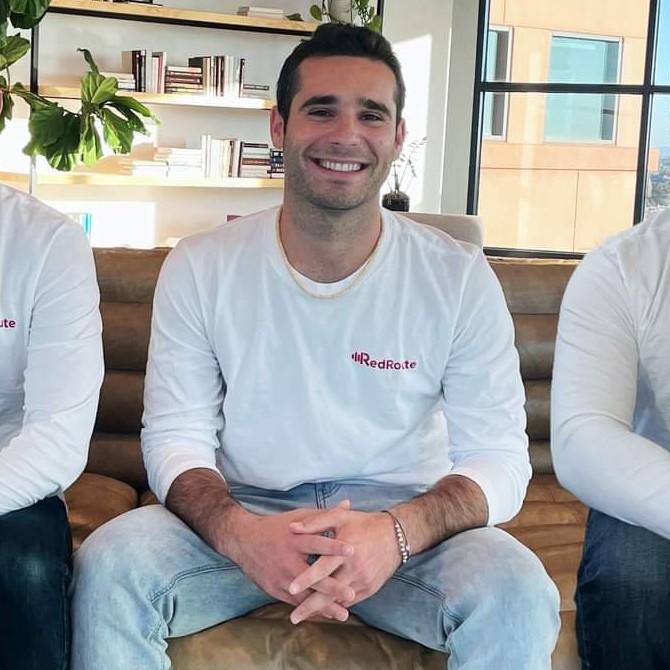
Brian Schiff
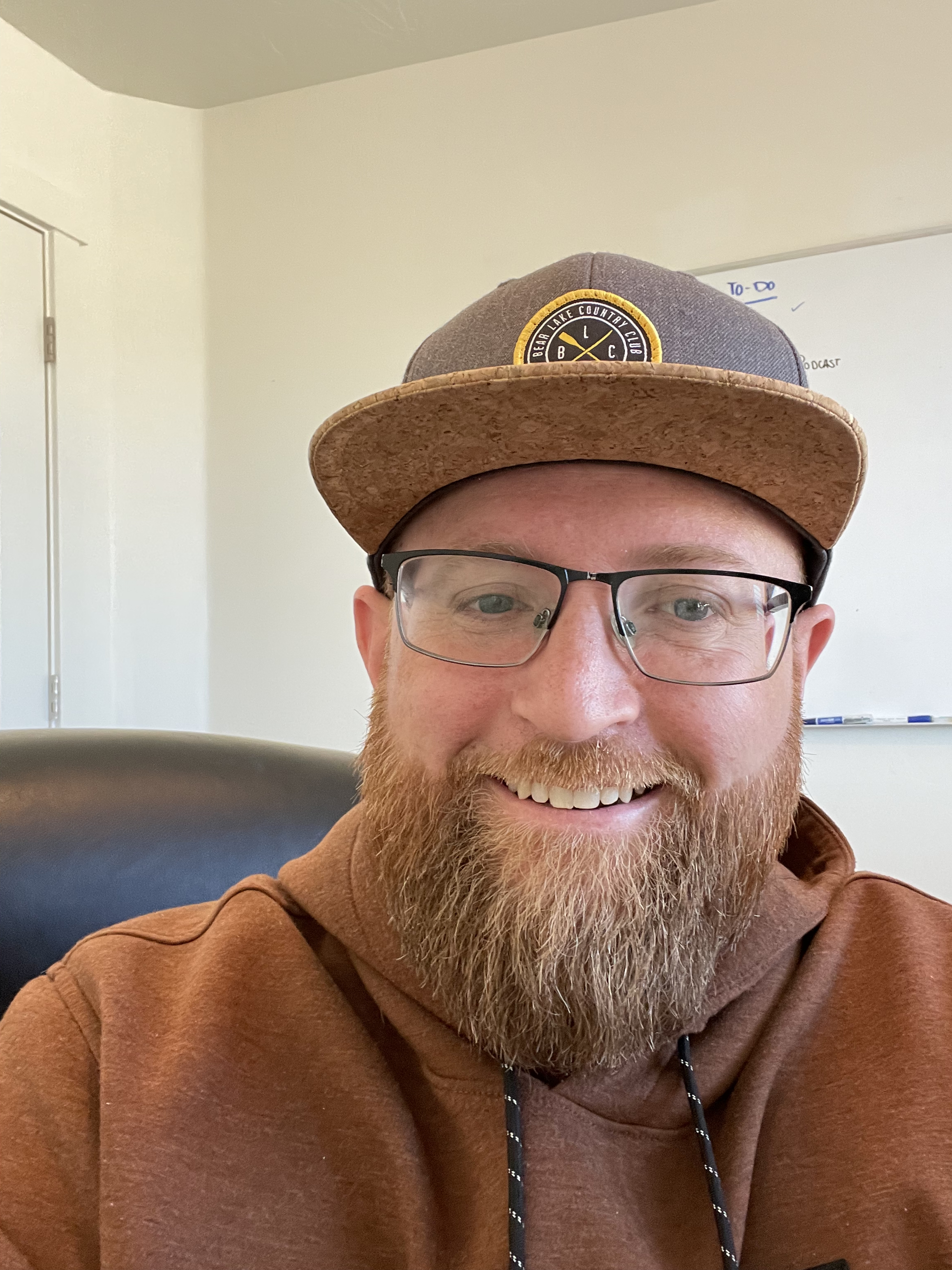
James Gilbert
Today's Guests
